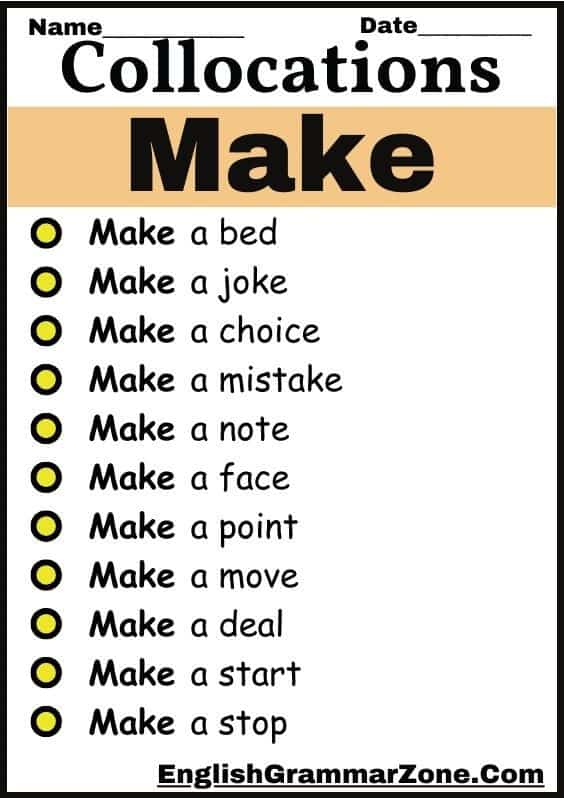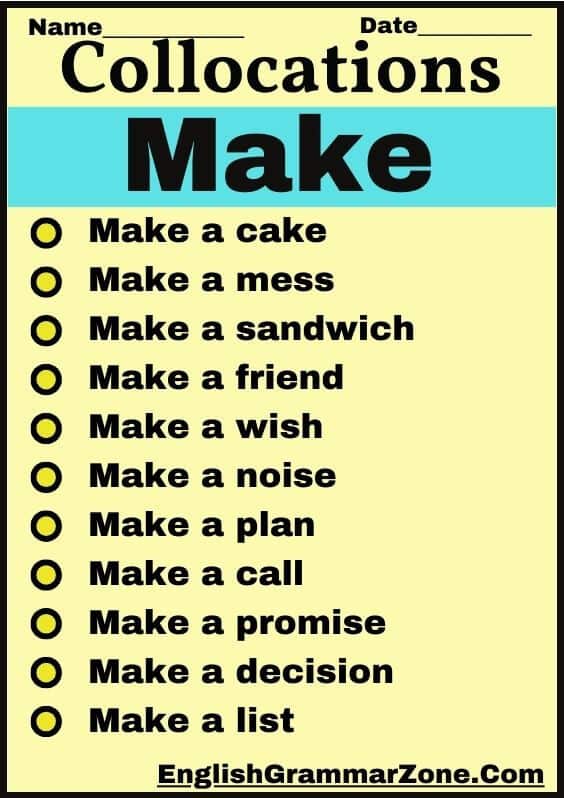Master the usage of collocation with make to enhance your English fluency. Learn common examples, practical applications, and tips to use these phrases naturally in your daily communication.
Collocation with Make

- Make a cake
- Make a mess
- Make a sandwich
- Make a friend
- Make a wish
- Make a noise
- Make a plan
- Make a call
- Make a promise
- Make a decision
- Make a list
- Make a bed
- Make a joke
- Make a choice
- Make a mistake
- Make a note
- Make a face
- Make a point
- Make a move
- Make a deal
- Make a start
- Make a stop
- Make a sound
- Make a drawing
- Make a song
- Make a gift
- Make a guess
- Make a picture
- Make a puzzle
- Make a letter
- Make a game
- Make a craft
- Make a project
- Make a map
- Make a wish
- Make a toy
- Make a card
- Make a poster
- Make a friend
- Make a snack
- Make a call
- Make a dinner
- Make a playdate
- Make a fort
- Make a costume
- Make a model
- Make a banner
- Make a bookmark
- Make a video
- Make a story
- Make a picture frame
- Make a scrapbook
- Make a diorama
- Make a board game
- Make a sculpture
- Make a necklace
- Make a bracelet
- Make a keychain
- Make a mask
- Make a hat
- Make a crown
- Make a treasure map
- Make a chart
- Make a calendar
- Make a clock
- Make a mobile
- Make a spinner
- Make a card game
- Make a journal
- Make a puppet
- Make a sock puppet
- Make a finger puppet
- Make a shadow puppet
- Make a flipbook
- Make a coloring book
- Make a picture book
- Make a sticker book
- Make a maze
- Make a quiz
- Make a word search
- Make a crossword puzzle
- Make a math game
- Make a spelling game
- Make a rhyming game
- Make a counting game
- Make a sorting game
- Make a matching game
- Make a board book
- Make a memory book
- Make a photo album
- Make a music video
- Make a slideshow
- Make a comic strip
- Make a comic book
- Make a graphic novel
- Make a play
- Make a puppet show
- Make a dance routine
- Make a cheer
- Make a chant
- Make a rhyme
- Make a rap
- Make a beat

- Make a song
- Make a melody
- Make a tune
- Make a symphony
- Make a harmony
- Make a duet
- Make a trio
- Make a quartet
- Make a band
- Make an orchestra
- Make a choir
- Make a songbook
- Make a music sheet
- Make a playlist
- Make a CD
- Make a recording
- Make a podcast
- Make a radio show
- Make a TV show
- Make a movie
- Make a documentary
- Make a news report
- Make a weather report
- Make a sportscast
- Make a forecast
- Make a headline
- Make a story
- Make a novel
- Make a poem
- Make a play script
- Make a report
- Make a research
- Make a survey
- Make an interview
- Make a questionnaire
- Make a checklist
- Make a logbook
- Make a diary
- Make a notebook
- Make a sketchbook
- Make a portfolio
- Make a resume
- Make a cover letter
- Make an application
- Make an invitation
- Make a thank you note
- Make a greeting card
Additional Tips:
- Create a List of Common Collocations:
Begin by noting down frequently used collocations with make, such as “make a choice,” “make a promise,” and “make a difference.” Review and practice them daily to internalize their usage. - Learn Collocations in Context:
Instead of memorizing collocations in isolation, try to learn them through sentences or short paragraphs. For example, “I need to make a decision about my career” provides context that makes the phrase easier to remember. - Use Them in Daily Communication:
Incorporate collocation with make in your daily life. For example, say, “Let’s make plans for the weekend” instead of using simpler or less natural phrases. - Practice With Exercises:
Search for online exercises or worksheets specifically designed for collocations. Activities like filling in the blanks or matching phrases can be both fun and educational. - Listen and Observe:
Pay attention to how native speakers use collocations in conversations, movies, or podcasts. Make notes of new phrases and try using them yourself.
By dedicating time to learning collocation with make, you can develop a stronger command of English and improve your ability to communicate with ease.
Conclusion:
Using collocation with make is an excellent way to enrich your English communication skills. These phrases not only make your language more natural but also help you build confidence in expressing yourself effectively. By practicing these collocations regularly, you can master their use and enhance both your spoken and written English.

